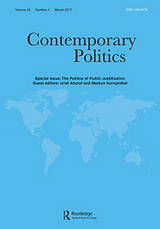
United in diversity? Analysing behaviour expectations of the European Union as a non-state member of the OECD’s development assistance committee
Keijzer, Niels / Joren VerschaeveExternal Publications (2018)
in: Contemporary Politics 24 (4), 379-397
DOI: https://doi.org/10.1080/13569775.2018.1432223
Information
The European Union (EU) frequently accentuates its position as the largest provider of Official Development Assistance (ODA). Together with the EU institutions, EU Member States represent 21 of the 30 members of the OECD’s Development Assistance Committee (DAC) that sets out rules and standards for what can be reported as ODA. Following the EU Treaty’s requirement for the EU to work together in international organisations, research has detected a tentative yet positive trend to this end in different international organisations (IOs). This article’s empirical analysis shows no such trend can be detected in the EU’s engagement in the DAC. Explanatory factors include divergent development cooperation approaches inside the EU, discrepancies between the established image of and everyday practice in the DAC, and the EU’s full DAC membership. The findings add to the literature on international organisation governance by exploring different behaviour expectations of non-state membership vis-à-vis that of states.

